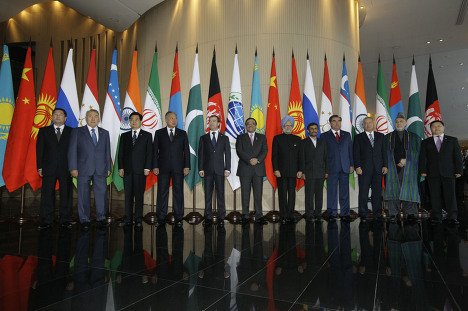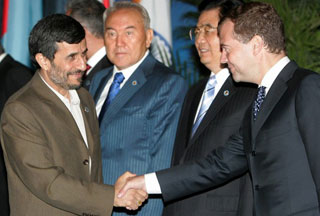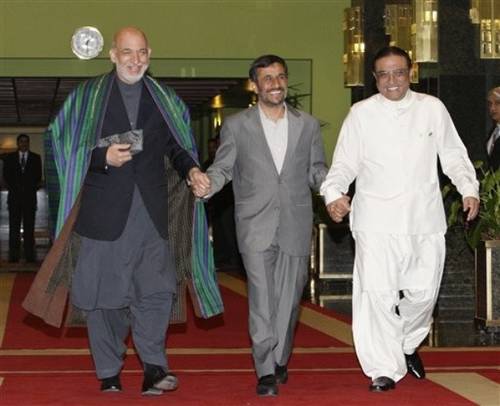
"The existing set of reserve currencies, including the US dollar, have failed to perform their functions." - Dmitry Medvedev, 6-17-09, Yekaterinburg, Russia
"The international capitalist order is retreating." - Mahmoud Ahmadinejad, 6-17-09, Yekaterinburg, Russia
"We don't have any problems with US investment." - M.A. Khatibi Tabatabaei, Iran's representative on OPEC's board of governors, clearly indicating Iranian oil officials' desire for US help in their energy sector, April 2009.
 Leaders of member and observer-status nations of the Shanghai Cooperation Organization (SCO) pose for a photo at their 2009 conference in Yekaterinburg, Russia, on June 16, 2009. Source: AP
Leaders of member and observer-status nations of the Shanghai Cooperation Organization (SCO) pose for a photo at their 2009 conference in Yekaterinburg, Russia, on June 16, 2009. Source: AP
The recent government crackdown in Iran has been reported with little to no attention paid in US press to the wider geopolitical game being played between West, East and South, in which Iran serves a key strategic and economic role. The recent significance of Iran on the world stage involves more than just democratic yearnings versus oppressive theocratic control, as that country is effectively serving as the rope in a global tug of war between massive alliances that vehemently oppose each other's wider agendas.
Despite a controversial national election barely completed (for which Russia, China and Venezuela congratulated him), and with subsequently massive riots erupting in the metropolitan cities of Iran, Mahmoud Ahmadinejad nonetheless raced up to Yekaterinberg, Russia to attend the ninth meeting of the Shanghai Cooperation Organization (SCO) two weeks ago. This SCO Heads of State Council meeting was chaired by Russian President Dmitry Medvedev, with whom Ahmadinejad made sure to secure a rushed, awkward photo op during his hours-long stay at said gathering. His presence there was more than symbolic; it was a direct challenge to the Western powers that Ahmadinejad, Iran's Supreme Leader Ayatollah Khamenei, and their tightly held Republican Guards (IRGC) and Basijis detest so much.
 Iranian President Ahmadinejad greets Russian President Dmitry Medvedev at the 2008 SCO Conference. The two work closely together on regional strategic issues. Source: RIA Novosti, Moscow.
Iranian President Ahmadinejad greets Russian President Dmitry Medvedev at the 2008 SCO Conference. The two work closely together on regional strategic issues. Source: RIA Novosti, Moscow.
SCO member states include permanent members China, Russia and the geostrategically critical Central Asian states of Kazakhstan, Kyrgyzstan, Tajikistan and Uzbekistan. Nations granted "observer" status by the SCO include Iran, Pakistan, India and Mongolia. The meeting purposefully overlapped in the same city with a summit of the so-called BRIC nations (Brazil, Russia, India and China).
Although not a military alliance (yet?) like NATO, the SCO is a burgeoning geopolitical experiment in shared strategic, economic and diplomatic goals by nations seeking to, in the words of Medvedev, "build an increasingly multipolar world order" along with a "more diversified international monetary system" -- i.e., a new global order where the United States and her closest allies are not the predominant economic, political, cultural and military forces on the planet. Acutely, the SCO/BRIC nations are acting out against the US dollar as the world's leading reserve currency, in which they claim they are forced to trade during increasingly precarious economic times, and in which the US Treasury Bonds they purchase through recycled dollars are denominated. The SCO/BRICs envision a new global currency reserve system to replace the dollar, and are even experimenting with multi-denominational trading. According to economist Michael Hudson, the SCO/BRIC nations "intend to trade in their own currencies so as to get the benefit of mutual credit, rather than give [accumulated credit] to the US." China and Brazil are very near bypassing the dollar and just trading via their mutual currencies. Their deal could set a trend amongst the other member states, and these summits -- which serve as alternatives to the World Economic Forum -- provide key venues for further honing such designs. Iran plays a critical part in such plans, as it stopped trading in US dollars last year, fully concurs with Russia and China's wider economic and energy agendas and carries energy clout to help make it all happen.
The SCO states are also increasingly on the same page with regard to global oil and natural gas priorities, many of which essentially underwrite the modern ability of the US to retain a global currency reserve standard, let alone run deficits ad nauseam without any outside checks. They see their core collective security mandate as one of protecting their indigenous energy resources -- as well as land and pipeline/transport routes -- from further US-led encroachments under the auspices of "fighting terrorism."
In fact, the energy stakes alone are driving much of the aforementioned tug of war. On June 3rd, 2009, China National Petroleum Corp. (CNPC) signed a $4.7 billion development deal with the National Iranian Oil Company in the South Pars field in Iran, which contains 14 trillion cubic meters of gas -- enough to supply Europe's general gas needs for 25 years. France's Total had originally signed a memorandum of understanding nine years ago for the project, but begrudgingly pulled out last year due to US pressure. Bad move. Moscow is pleased with these circumstances, as it doesn't want Iran to ship gas to the EU, preferring to retain its own near-monopoly status over Europe. Iran and Russia have also discussed the likelihood of arranging a natural gas version of OPEC, which further draws Washington and London's ire.
The US and EU should open Iran up to Europe as a key alternative provider, via the planned Nabucco gas pipeline, which would need Iranian approval and land to operate. In fact, Iran recently expressed interest in supplying gas to Europe via Nabucco, as well as to Turkey, which Nabucco would traverse. Yet typically, Washington said earlier this month that it opposes the idea due to -- what else? -- sanctions on Iran (the continued effectiveness of which one must now wonder aloud about). EU states, Turkey, India and other US allies are awaiting a relaxation of said sanctions so that they can proceed with development and consumption of Iranian energy and other markets in an above-board fashion (versus via black market trading, which has skirted said sanctions in various sectors for decades). According to analyst Vladimir Socor of the Jamestown Foundation, "Iran will not willingly accept Russian control over its gas exports, unless the US sanctions continue to discourage Western companies from investing in, and operating, Iranian gas development and gas transport projects."
The Obama administration must also race against China for energy access and influence in Iran. Obviously, Washington has massive ground to make up, and the Chinese are swift and resourceful, with at least two imminent pipeline linkages into Iran -- the Turkmen-to-China pipeline, and the recently signed Iran-Pakistan gas pipeline, which challenges the US-backed TAPI pipeline and is thus considered anathema by Washington and London.
Iran is the kid in the playground with his hands in the air, anxiously wishing to be picked by the SCO/BRIC team while seeking protection from the US/UK/EU bully. The former are very close to picking Iran for their team, while the latter needs to shift its strategy immediately in order to win over this critical player. According to Russian analyst Andrei Areshev, Iran joining the SCO "will render the US's attack on Iran impossible and put an end to America's plans of redrawing the lines in the Middle East and Central Asia." Russian Prime Minister Vladimir Putin has proclaimed that each SCO member (including those with "observer status") "offers its competitive advantages to be added to the common asset of interaction on international markets." For Iran, this presumably references her vital energy resources and strategic positioning atop the Persian Gulf, Strait of Hormuz and Indian Ocean. The head of Russia's Center for Contemporary Studies on Iran stated in 2007 that the SCO would strengthen greatly from Iran's formal inclusion, "because its member states would be the owners of two thirds of the world's energy sources, which gives them a great financial power." At last year's SCO summit, Iranian Vice President Parviz Davudi confirmed that the SCO "is a good venue for designing a new banking system which is independent from [existing] international banking systems."
With regard to the recent Iranian elections, Russia and China cannot afford to have a personnel change in Teheran where a new administration would be even remotely receptive towards US and UK economic, diplomatic and/or strategic interests. Many in Iran as well as abroad have sensed such an opening to the West could've become likely under a more reformist Mousavi or Karroubi presidency. Ahmadinejad is someone Russia, China, Venezuela and Pakistan have come to trust and do business with for four years, and he is obviously favored by Iran's head cleric. Ahmadinejad was also a member of the IRGC, which essentially controls revenues from the Iranian oil ministry as well as other vital industries. One would naturally wonder what operational or consultative connections could exist between Moscow, Beijing and the neatly vertically integrated Khamenei/Ahmadinejad/IRGC/Bonyadi state-held corporation.
 Leaders of neighboring nations at a regional summit are, from left: Afghan President Hamid Karzai, Iranian President Mahmoud Ahmadinejad, and Pakistani President Asif Ali Zardari. Iran and Pakistan just signed a deal for a major gas pipeline, which the Russians are anxious to build, and are open to India or China receiving end routes of the pipeline as well. Source: Jamestown Foundation.
Leaders of neighboring nations at a regional summit are, from left: Afghan President Hamid Karzai, Iranian President Mahmoud Ahmadinejad, and Pakistani President Asif Ali Zardari. Iran and Pakistan just signed a deal for a major gas pipeline, which the Russians are anxious to build, and are open to India or China receiving end routes of the pipeline as well. Source: Jamestown Foundation.
As Chris Cook, the former director of the International Petroleum Exchange, recently commented about the post-election backlash in Iran, "[t]his is an economic, not an ideological struggle...Indeed, the friendlier and more helpful the US is, the more difficult will be the new [Iranian] government's position." In other words, Washington should tailor its engagement strategy with Iran on economic grounds. Continued sanctions, state terror listings, stoking a lukewarm "Twitter Revolution," and feeding arms and capital to fringe groups like Jundallah in Iran's Pakistan-adjacent southeast, will do nothing but drive Iran further into awaiting Sino-Russian arms.
Washington needs to lift sanctions tactically in vital industries, push for the employment of the youth who've been rioting in the streets, and gradually shift the loyalties of that middle class -- along with, eventually, the elite and their state apparatus -- away from the building Sino-Russian Axis. When a 20- or 30-something Iranian is working for the Exxons, G.E.s, Microsofts, Cargills and Mercks of the world, she will frown at the less capable Sinopecs, Gazproms, et al., along with Iran's ossified governmental and economic structures. Unsophisticated Khamenei-appointed factions within the energy and economic machines will either need to catch up to the demands of first-rate American technological and commercial standards, or leave. IRGC corruption will have to adapt to Western standards of corporate transparency, or fold. Yet, at least initially, such an approach must adapt a bit to Iran's state-owned and interest-free business and financial platforms in order to play ball. Once successful over a period of time, the entire enterprise could also lead to a reintegration of US firms with Iranian allies Venezuela, Bolivia, Ecuador and others as well. Economics dictates politics. Anywhere, anytime.
The ultimate alternative to any of the above is further friction, and inevitably, war. Yet for those who say "let's just go to war with Iran already and settle all of this once and for all, as regime change won't happen otherwise," realize that such a foolhardy endeavor would not emulate the Iraqi or certainly Afghan "campaigns." It would not be a case of relatively manageable perpetual occupation and resource appropriation, but would essentially escalate into a war against Eurasia, South Asia and any other power or regional alliance that empathizes and works with Iran (I.E. the globe's southern hemisphere).
With regard to the Obama administration's next moves towards Iran, at the very least the utmost prudence must be exercised, and unprecedented diplomacy deployed, in order to preserve the American and Western way of life.